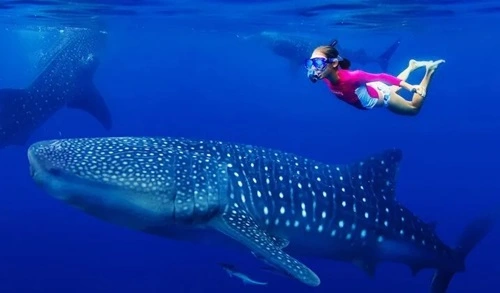Whale sharks are some of the most awe-inspiring creatures in the ocean. Known for their massive size, gentle nature, and unique markings, whale sharks have captured the fascination of marine enthusiasts worldwide. Despite their name, whale sharks are not whales but the world’s largest species of fish. Here are over 10 fun and fascinating facts about whale sharks that reveal just how remarkable these gentle giants truly are.

1. The Largest Fish in the Sea
Whale sharks hold the title of the largest fish species on Earth, reaching lengths of up to 40 feet, with some individuals rumored to be even larger. They can weigh as much as 20.6 tons, equivalent to the weight of several elephants. Despite their immense size, these gentle giants are known for their peaceful and slow-moving behavior, gliding gracefully through the water.
2. Not Whales, But Sharks
Despite their name, whale sharks are not whales; they are true sharks. The name “whale shark” comes from their size, which is comparable to some whale species, and their filter-feeding habits. Like all sharks, whale sharks have a cartilaginous skeleton, gills for breathing, and they belong to the Chondrichthyes class. Unlike many other shark species, however, whale sharks are docile and pose no threat to humans.
3. Unique Spots Like Fingerprints
Each whale shark has a unique pattern of spots and stripes on its body, similar to a human fingerprint. This unique “fingerprint” allows researchers to identify individual whale sharks and track their movements and behaviors. Citizen science initiatives, like uploading photos of whale shark encounters, have become a valuable tool for researchers who use these photos to study and monitor whale shark populations around the world.
4. Filter Feeders That Eat Tiny Prey
Whale sharks are filter feeders, meaning they consume small organisms instead of hunting large prey. They feed primarily on plankton, small fish, and tiny crustaceans. Whale sharks feed by swimming with their mouths wide open, allowing water to pass through their gills while filtering out food. They can filter over 1,500 gallons of water an hour, capturing food through a set of specialized gill rakers.
5. Massive Mouths with Thousands of Tiny Teeth
A whale shark’s mouth can open up to five feet wide, but despite this impressive size, it primarily filters tiny plankton and small fish. Inside their massive mouths, whale sharks have over 3,000 tiny teeth arranged in rows. However, they don’t use these teeth for feeding. The teeth are vestigial, meaning they have little function, as whale sharks rely on their filter-feeding mechanism instead.
6. They Are Long-Distance Travelers
Whale sharks are known to migrate over vast distances in search of food and breeding sites. Some individuals travel thousands of miles, crossing entire oceans. Researchers have tracked whale sharks moving from the coasts of the Philippines to the waters off Taiwan and even across the Indian Ocean. These long-distance migrations make them difficult to study but also emphasize their incredible resilience and adaptability.
7. Whale Sharks Can Dive to Impressive Depths
While whale sharks are often seen near the surface, they are capable of diving to remarkable depths. Researchers have recorded whale sharks diving as deep as 6,000 feet. These deep dives are thought to be related to feeding behaviors, thermoregulation, or navigation. Studying these dives provides scientists with valuable insights into whale shark behavior and the ocean’s mysterious deep-sea ecosystems.
8. Warm Water Lovers
Whale sharks are primarily found in tropical and warm temperate waters around the world, thriving in ocean temperatures between 70°F and 80°F. They are commonly seen in areas like the Philippines, Mexico, and the Maldives, where warm waters encourage the growth of plankton and small fish. The availability of warm, plankton-rich waters in these regions makes them ideal habitats for whale sharks to feed and gather.
9. Gentle Giants of the Sea
Despite their size, whale sharks are known for their calm and gentle nature, posing no danger to humans. Unlike other large marine animals, whale sharks do not exhibit aggressive behavior. Divers and snorkelers can often swim alongside them in several popular locations worldwide. These gentle giants tend to ignore human presence, making encounters with them an awe-inspiring experience for divers.
10. Slow to Mature and Long-Lived
Whale sharks are slow-growing, reaching sexual maturity at around 25 to 30 years old. They are also believed to have a lifespan of up to 70-100 years, making them one of the longer-lived shark species. This slow growth and late maturity make whale sharks vulnerable to overfishing and other human-related threats, as it takes a long time for populations to recover once they are depleted.
11. Known to Give Birth to Live Young
Unlike many fish that lay eggs, whale sharks are ovoviviparous, meaning they give birth to live young. The eggs develop and hatch inside the female’s body, and the pups are born fully formed. Whale shark litters can contain hundreds of pups, though only a few survive to adulthood. The largest known litter of whale shark pups contained 300 embryos, discovered in a female whale shark off the coast of Taiwan.
12. They Are Protected in Many Parts of the World
Due to their vulnerable status, whale sharks are protected by law in many countries, including Australia, the Philippines, and Mexico. They are listed as “Endangered” by the International Union for Conservation of Nature (IUCN) due to threats such as fishing, boat strikes, and habitat degradation. Conservation efforts, including marine protected areas and tourism guidelines, aim to protect these gentle giants from further population decline.
13. Whale Sharks Help Maintain Ocean Health
As filter feeders, whale sharks play an important role in the health of marine ecosystems. By consuming plankton, they help control plankton populations, which in turn helps balance oceanic food chains. Their feeding activities also help distribute nutrients throughout the water column, supporting other marine species and contributing to a balanced ecosystem.
14. They Have Unique Adaptations for Feeding and Buoyancy
Whale sharks have evolved several adaptations that aid in their filter-feeding lifestyle. They possess specialized gill rakers that trap food as water flows through their gills, and they can “cough” to clear out any excess particles from their gills. Additionally, whale sharks have a high concentration of lipids in their liver, which helps them maintain buoyancy, allowing them to stay afloat despite their massive size.
15. Whale Shark Tourism is Booming and Helps Conservation
In several parts of the world, whale shark tourism has become a popular and profitable industry. Places like Isla Holbox in Mexico, Donsol in the Philippines, and the Ningaloo Reef in Australia attract thousands of visitors who come to swim with whale sharks. These ecotourism activities have created economic incentives to protect whale sharks, leading to stricter fishing regulations and improved conservation efforts in these areas. Responsible tourism, when done with strict guidelines, allows people to appreciate these gentle giants while helping fund conservation initiatives.
Whale Sharks: Ocean Giants with Incredible Qualities
From their impressive size and gentle nature to their vital role in marine ecosystems, whale sharks are truly one of the ocean’s most magnificent creatures. Each of these fascinating facts highlights why they are so admired and underscores the importance of conserving these gentle giants. Whether it’s through research, conservation efforts, or responsible tourism, the more we learn about whale sharks, the better we can protect them for future generations to enjoy. Encountering a whale shark in the wild is a life-changing experience and a reminder of the incredible diversity and beauty found in our oceans.



